- Home
- William Kowalski
Eddie's Bastard Page 5
Eddie's Bastard Read online
Page 5
His first thought, however, was for his penis. It was two or three o’clock in the afternoon, and the full brunt of the southern sun was blasting down on him like a thousand bonfires. The rest of him was tanned a deep nut brown from his last summer on the Lake, but from his waist to the tops of his thighs Thomas Junior was as pale as a missionary. His penis was completely unprepared for a frontal solar assault. He was afraid it would get sunburned. It was that thought, and no other, which motivated him to get up and look for shade. If not for that, he might have lain there forever, just breathing.
When he stood up, Grandpa told me later, he puked seawater. He must have swallowed gallons of it during his mad rush through the ocean. He took a few steps and puked seawater again.
“Sometimes I think I spent the whole damn war just throwing up,” Grandpa told me later.
He decided it would be wiser to crawl from that point on, so he moved like a baby on his hands and knees, away from the gently rolling surf and into the line of bushes and palm trees. Once his manhood was safely shaded, he made himself a nest of leaves—huge leaves, bigger than any leaves he’d ever seen in his life—and went to sleep.
When he woke up, there was a small, dark-skinned man standing above him. The sun was almost down, and there was barely enough light to see by. The little man was silhouetted against the surf, which glowed a deep dark blue in the sunset, and the horizon, which was orange. Thomas shot to his feet. He and the little man stood there looking at each other. Neither of them moved.
“Japs are just like rattlesnakes,” Grandpa said later. “They’re just as afraid of you as you are of them.”
Technically, Thomas knew, he was supposed to kill any Japanese he met. That was what war was about. Failing that, he was to take them prisoner. He’d spent the two years since the attack on Pearl Harbor working himself into a frenzy of hatred against the Japanese. There had been a time when he was quite capable of killing one. But standing here in front of this little man, Thomas realized that he didn’t want to kill anybody, and he didn’t know how to take someone prisoner. Besides, he had no weapon to threaten him with, and it seemed ridiculous to say, “You’re my prisoner. Come with me.” What was he to do with him? So they stood there looking at each other, until the sun went down and blue faded to bruise-purple and then soft black. A chill sea breeze began to blow across the island. Grandpa and the Japanese soldier began to shiver in unison.
Seeing this, realizing Japs got cold too, Thomas decided then and there to resign from the U.S. Army. The war was over for him. He was exhausted and nauseated and hungry, and when you came right down to it, the only reason he’d really wanted to go to the war was so girls would pay attention to him when he got back. Right at that moment, that seemed like the stupidest reason in the world.
There is an entry in Willie Mann’s diary that addresses this very issue. I know about it because the diary is back in possession of the Manns again, after an absence of several decades, and I have it with me now. Like many of Willie’s later entries, made when he was an old man reflecting on his long and strange life, it’s concise, well written, and philosophical in nature—and by that time his grammar and spelling had greatly improved. Wrote Willie:
Men are fond of blaming their wars on women. Poor Helen suffers the blame for the siege of Troy, as if she asked to be kidnapped and then rescued. But it’s not the fault of women that men go to war against each other. It’s the fault of men for being warlike in the first place.
“We need a fire,” said Thomas. He pantomimed the rubbing together of two sticks. The Japanese pilot nodded, his Asian eyes—the first Thomas had ever seen—guarded but enthusiastic.
“That’s a fine idea,” said the pilot. “It’s getting a little cold.”
Thomas was flabbergasted. He stared openmouthed at the pilot.
The pilot cleared his throat uncomfortably after several moments. “I said, ‘That’s a fine idea,’” he repeated. He was wondering if my grandfather perhaps had a hearing problem.
“You’re speaking English,” said Thomas.
“Do you speak Japanese?” inquired the man.
Thomas shook his head. The pilot smiled. His white teeth glistened in the dusk.
“I didn’t think so,” he said triumphantly. “Therefore, I’m speaking English.”
“Well, I’ll be damned,” said Thomas.
“I am Enzo Fujimora,” said the pilot. “Harvard class of thirty-five.”
“Well, I’ll be damned,” said Thomas again. “A Jap Harvard man.”
“Exactly,” said Enzo Fujimora, and he bowed slightly from the waist.
“My mother wanted me to go to Harvard,” said Thomas. It sounded ridiculous, but that was all he could think of to say.
“Your mother has high aspirations for you,” said Enzo Fujimora. “I hope someday you are able to attend. I liked it there very much. Shall we make a fire?”
That’s the story of how my grandfather met the man who was to change the course of his life forever, as told to me by himself more times than I can remember, enough times so that I can recite it as I have here almost as if it really happened to me.
Enzo Fujimora was thirty years old. He was a schoolteacher, the son of a well-to-do family in Nagasaki, and he had a wife and two children—a boy aged three and another aged seven. When the atomic bomb was dropped on his hometown two years later, all three of them were wiped out in an instant. Enzo could not have known this ahead of time, of course, but Grandpa said later that he wouldn’t have behaved a bit differently if he had. He was a devout Buddhist, and up to that point he was the most profound person Thomas had ever met. He believed people should live every moment as if it were to be the last.
“That,” said Enzo, “is the best way to avoid wasting time.”
It was three long weeks before they were discovered. In that time, Enzo Fujimora and my grandfather became fast friends. They were both naturally amiable and outgoing, and they shared a distaste for war and in fact for violence in general. During their time together on that tiny South Pacific island, they told each other every detail they could remember of their lives, right up to the point where they had met in midair in their respective airplanes. Enzo had been separated from his squadron when he spotted the American cargo plane, and he had thought to cover himself in glory by shooting it down to avoid the disgrace of getting lost.
“It was a selfish action,” he told Thomas. “I deeply apologize.” And he bowed again. Thomas, who was a fast learner, bowed back.
There was a tiny pool of fresh water on the island, but it was not spring-fed and it was covered with a floating blanket of green scum. There was also very little food. Enzo had a pistol with six rounds of ammunition, and with it they managed to shoot two parrots. Other than those birds, which were musky in flavor and tough to chew, the only things they had to eat were some sort of tiny fruit, which gave them diarrhea, and a few herbs that grew near the spring.
Enzo recognized the herbs right away. As he told Grandpa, he was an herbalist as well as a pilot; the knowledge of herbs was a tradition in his family that went back several generations. What he really wanted more than anything was to return to Massachusetts someday and practice herbal medicine. He taught Grandpa the Japanese names for the plants they found. Perhaps because there was little else to do, Grandpa found himself interested. He rapidly mastered the names and various uses of wormwood, fennel, and henbane. Enzo, finding a willing student in my grandfather, went on to teach him everything he could remember in the three weeks they were together.
In return, Grandpa read aloud to him from the diary of Willie Mann. They were both hearing it for the first time, and far from being the monotonous account of farm life Grandpa had expected, it was fascinating. It got easier to read, too, as they progressed further, for Willie had gradually and on his own mastered the mechanics of spelling and grammar, until by the time he was forty or so his entries read with the smoothness and ease of Dickens or Proust—both of whose works Enzo had read. The slig
ht Japanese pilot sat and listened, enthralled, for as long as Grandpa cared to read to him. When Thomas’s voice grew tired, Enzo read it himself, silently, pondering over the truths contained therein like a Talmudic scholar.
One day their longed-for rescue took place. A single-engine American fighter plane flew overhead, attracted by the smoke from the signal fire they kept burning day and night on the beach. The next morning the silhouette of a ship appeared on the horizon; it rapidly grew closer. Thomas and Enzo watched in silent apprehension as it approached. Enzo, they both knew, was about to become a prisoner of war, and my grandfather was probably going to have to return to active duty. Neither of them were thrilled with the prospects their immediate futures seemed to hold, but it was better for both of them than being found by the Japanese. Grandpa had heard horror stories about how they treated American prisoners—although doubtless Enzo had heard the same stories about American treatment of Japanese prisoners—and Enzo certainly would have been in disgrace for having been lost and then shot down. Too, the pair were emaciated, dehydrated, sunburned, and so starved they were no longer hungry, and so rescue by either side was better than the certain death that otherwise would have been their lot.
“That Robinson Crusoe business is all a bunch of hooey,” said Grandpa to me later. “We probably would have been dead within the week if they hadn’t found us.”
A flare went up from the ship as it anchored offshore. As a landing party made its way toward the island in a small skiff, Grandpa turned to Enzo impulsively.
“Here,” he said, handing him the diary. “I want you to take this.”
Enzo looked at him in bewilderment. “I cannot,” he said. “This is the property of your ancestors.”
“You can give it back someday,” said Thomas. “I don’t want you to keep it forever. But you seemed to get a lot more out of it than I did.” He was thinking that Enzo would need something to keep his mind occupied while he was a prisoner. And the truth was that Thomas didn’t want it. The diary contained many stories, fascinating stories, about his family. But it had also informed him of something he would rather not have known. In fact, he realized with a shudder, he was the only Mann to know the true story of his grandfather’s Civil War experiences, the only Mann to know that Willie Mann was not a hero at all. That he had never been in battle. That it was not a Confederate musket ball that wounded him. That, in short, Willie did not deserve all the recognition and admiration that had been his all his adult life. Willie had given him the diary with the full knowledge that Thomas would find out the truth about him when he read it; Thomas thought this was an incredibly reckless act, and was wishing now that the old man hadn’t given it to him at all.
Enzo, however, was touched by the gift. He knew nothing of Thomas’s reaction to the diary; to him it was a wonderful story, one that inspired him and made him think. Thomas had said he must give it back “someday.” In those days, someday was a brave and optimistic word to be using. One didn’t know, in wartime, how many more days lay ahead. There was absolutely no guarantee that either of them would make it through the war alive.
“I will return it, if I live,” said Enzo. “I swear it.”
“I believe you,” said Thomas.
The landing party made shore. Thomas, naked, saluted and reported Enzo, also naked, as his prisoner. Enzo was placed under guard and, once on board the ship, manacled and locked in the brig.
“That was the last I ever saw of him,” said Grandpa to me, some thirty-five years later. “But he still has the diary. I made them let him keep it. And he’s going to bring it back—I know he will. He was the most trustworthy fellow I ever knew, American or Jap or otherwise.”
I first heard this story when I was about six years old, or rather that’s the first time I remember hearing it. I’m sure I must have heard it before then. The first time Grandpa told it to me, I already knew the ending, so perhaps I’d been hearing it from the time I was born or even before, as if in my sleep. Grandpa used to talk me to sleep when I was little, his cracked bass voice soothing and lulling me as it rose and fell like those Pacific waves he’d swum through to reach safety. This was one of my favorite bedtime stories. I always felt the same thrill of security when he landed on the beach, just ahead of the sharks that had already consumed poor Phillip Neuberg of Kansas City. I could feel them nipping at my toes as I raced through the salt water, which felt to me in my imagination as warm and salty as blood, not cold and tasting of pond water like Lake Erie. I would shiver with excitement and pull my feet well clear of the end of the bed, so nothing could reach up from underneath it and grab me in the darkness.
One might think a story about Japanese fighter planes and sharks would give a young boy nightmares. I had nightmares aplenty, but they weren’t about that. They were entirely different. It was only one nightmare, really, repeated over and over. In it, I’m not me. I’m a girl. I’m running through the woods, frightened beyond words, holding up my dress so I won’t trip over it. There are men in uniform chasing me, soldiers, not from this country. They speak a different language and their uniforms are bright green with red trim. The woods are familiar to me. They’re these woods, here, the woods of Mannville, but long before there were subdivisions and trailer parks. The forest is deep and menacing, with scarcely a shaft of sunlight penetrating the trees. I run like a wildcat, always just ahead of them. I can hear their puffing and blowing and their strange guttural shouts, the jangling of the equipment on their belts. And just when I think I’ve lost them, I trip over a root and fall flat on my face. The soldiers are upon me in an instant. They surround me in a circle. One of them draws his sword, holds it up high, and in one swoop, he cuts off my head.
The picture goes dark.
I always awake from this dream screaming. Grandpa comes when he hears me, more often than not. When he does he lies down next to me in my bed and throws one arm over me.
“Easy,” he whispers. “Easy now, lad.”
“They were chasing me,” I whimper.
“I know,” said Grandpa. “They chase me too. And you were her, weren’t you? Not yourself, but a girl?”
I nod. I’m far too young to find it odd that Grandpa should know what my nightmare is about before I tell him. He’s Grandpa; he knows everything.
“I have that dream too,” said Grandpa. “We all had it, all of us Manns. We’re supposed to.”
“I hate it!”
“It’s the price we pay,” says Grandpa, “for our greatness.” And he sighs, not a sigh of apprehension but one of deep contentment, because my having this dream is the final proof that I really am a Mann, more conclusive evidence than any DNA test ever would have been, and also it shows that we are not yet completely fallen. For as long as we pay the price, there must be something to be obtained from it, and we are not doomed after all. Perhaps, Grandpa is thinking, our greatness has only just begun.
When Grandpa returned to Mannville at the end of the war, he was given the elaborate sort of welcome that people have always reserved for their greatest heroes. His mother, Lily, had already spread the story of how he was shot down and survived on a desert island by his wits, omitting for the sake of Mann honor his friendship with Enzo Fujimora, and perhaps embellishing other details here and there. When he disembarked from the train, there was a crowd of four hundred people there to welcome him, many of whom were convinced that Thomas was an ace fighter pilot who had taken over the island himself by single-handedly slaughtering the hundreds of Japanese who occupied it. Several of them carried signs, saying WELCOME HOME, TOMMY BOY! and MANNVILLE SALUTES ITS HERO. It was December of 1945. Thomas had left as a nineteen-year-old boy and returned a grizzled twenty-two-year-old veteran. He’d finished out the war at a desk job, as he’d requested after his rescue, but nobody seemed to know that. He carried with him only his duffel bag and his memories of the screams of Phillip Neuberg, and he jumped down to the platform, kissed his mother (who was briefly and regally hysterical), shyly greeted the crowd, and went home
to the family seat, the huge farmhouse on the north side of town.
Thomas himself had no delusions about his role in the war. He’d only done what he had to do to survive, as had everyone else who’d made it home, and he didn’t consider himself any more of a hero than the other boys from Mannville. Some of them had come home missing an arm or a leg, or with holes blown through their sanity, and some of them hadn’t come home at all. Thomas felt no pride, no heroism when he thought of himself in comparison to these other wartime victims. But he found his mother greatly changed toward him. She worshipped his presence like a devoted servant. Lily had grown terribly lonely during his absence, Thomas discovered, and she’d aged a good deal more than the three chronological years he’d been gone; her hair was mostly gray, though she was just over forty, and her heart was beginning to fail. She’d barely managed to maintain her queenly facade through the war. She’d been waiting for Thomas to come home so that she could begin the gradual process of turning over the farm and its various side industries to him, her only son; and that huge trust, combined with the wide-eyed awe with which he was treated in town, began to swell inside him, until he walked with a strut and affected a fancy mustache, and didn’t correct people when they accidentally called him “Lieutenant.” He never mentioned what he’d discovered about his grandfather in his diary, of course; there was no reason to upset his mother, and it had all happened so long ago that it didn’t matter anyway. He put those nagging doubts to rest by ignoring them. And the diary was safe in Japan, where nobody in Mannville would ever find it. That was the other reason he’d given the diary to Enzo. He couldn’t quite bring himself to destroy it. Better to send it far away.

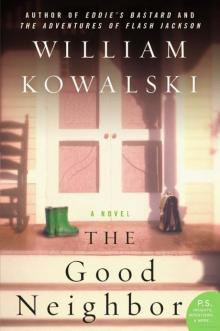 The Good Neighbor
The Good Neighbor Eddie's Bastard
Eddie's Bastard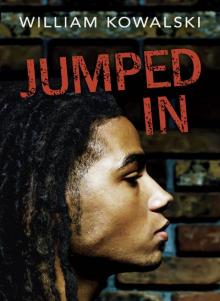 Jumped In
Jumped In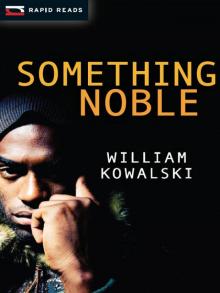 Something Noble
Something Noble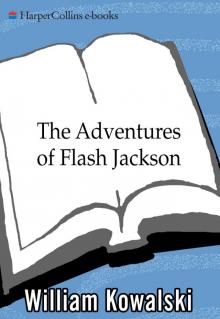 The Adventures of Flash Jackson
The Adventures of Flash Jackson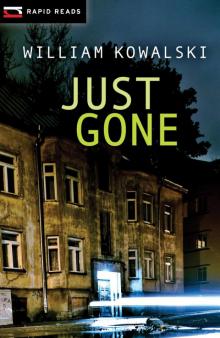 Just Gone
Just Gone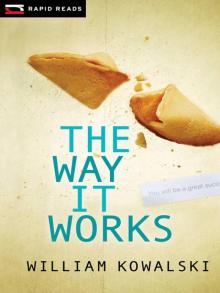 The Way It Works
The Way It Works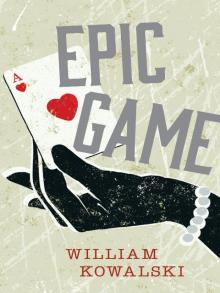 Epic Game
Epic Game